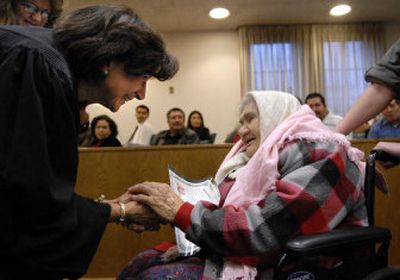A new life at 99

One of the nation’s newest citizens also is among its oldest. Nadezhda Ivanova Deynega, who turns 100 in January, loves everything about America.
“So many people coming here every year, and there is enough bread for everyone. It’s amazing,” said Deynega, who was one of about 50 people sworn in as U.S. citizens in Spokane on Thursday by federal U.S. Magistrate Judge Cynthia Imbrogno.
To Deynega, it’s really all about the bread. There were so many times when there wasn’t any.
Born in 1907 in Krasnodar in southwestern Russia, Deynega lived though two of the most pivotal events of the 20th century. The Russian Revolution and World War II were also among the most desperate.
Deynega, who does not speak English, was granted a rare waiver to become a citizen without learning the language because of her eyesight. She spoke Thursday through an interpreter.
Among her fondest memories was of growing up on a large farm in the Krasnodar region on the Black Sea at a time when the soil was plowed behind oxen. Her family owned a flour mill and was fairly wealthy then.
“There was much wheat and big fields,” she said. “There was milk and flour, then.”
She was 10 when the revolution changed everything. Lenin came to power. Her home became a hospital.
“Many went to prison, and the rich became poor,” she said.
Her grandfather, father and husband, Gregory Korobyev, were exiled to Siberia for a time. Among the eight siblings in her family, she was the only one who survived. Some starved to death in the late 1920s and early 1930s, Deynega said.
Korobyev was killed in World War II, leaving his wife with six children. Three were hers, and three were his by a previous marriage.
“The war was very hard,” Deynega said. “In the summer we would go to the forest to pick berries, which we dried to make bread in the winter. This is how we survived.”
After the war, her family was persecuted because they were Baptist, she said. Children under 18 were not allowed to go to church, and their faith was driven “underground.”
Deynega came to the United States in 1996 and joined other family members, including children and grandchildren, in Spokane. Since 1989, about 500,000 refugees from the former Soviet Union have immigrated to the United States under the Lautenberg Amendment, which grants special status to Evangelical Christians, as well as Jews and Ukrainian Christians with qualifying relatives who are already here.
Between 1993 and 2003, about 143,000 Bosnian refugees also were resettled in the United States under provisions of the amendment. It is estimated that between 10,000 and 20,000 former Soviet or Slavic refugees currently live in Spokane, according to Wendy Hernandez, an attorney for World Relief, which has assisted in settling many of them.